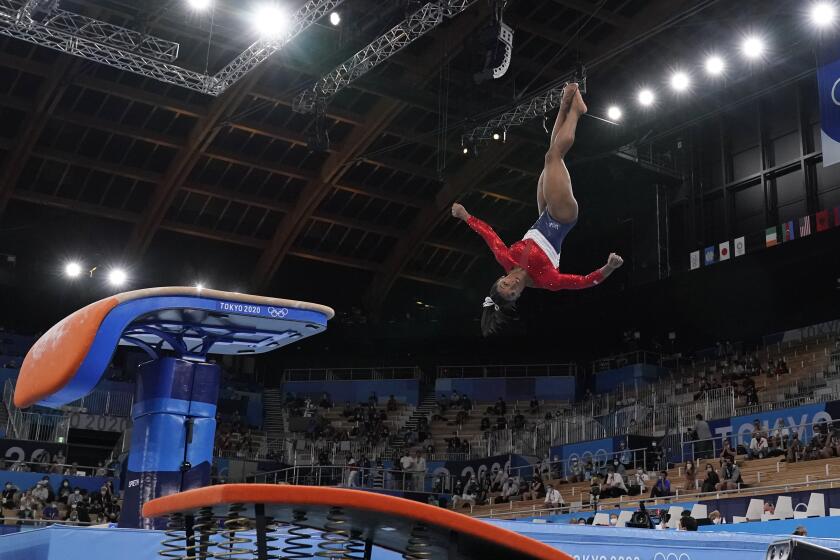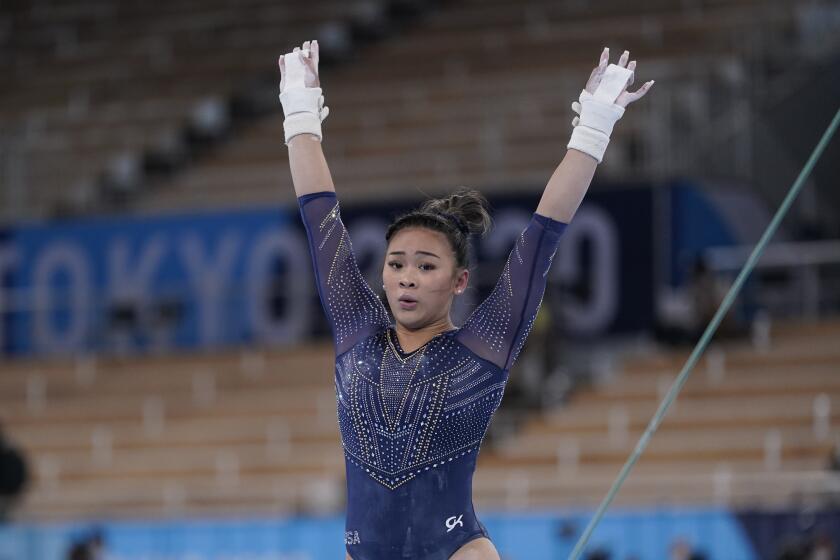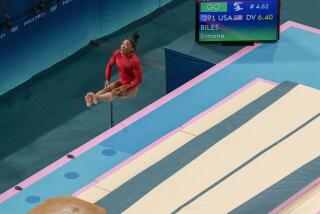‘I was doing it more for myself’: Simone Biles returns to win bronze in balance beam
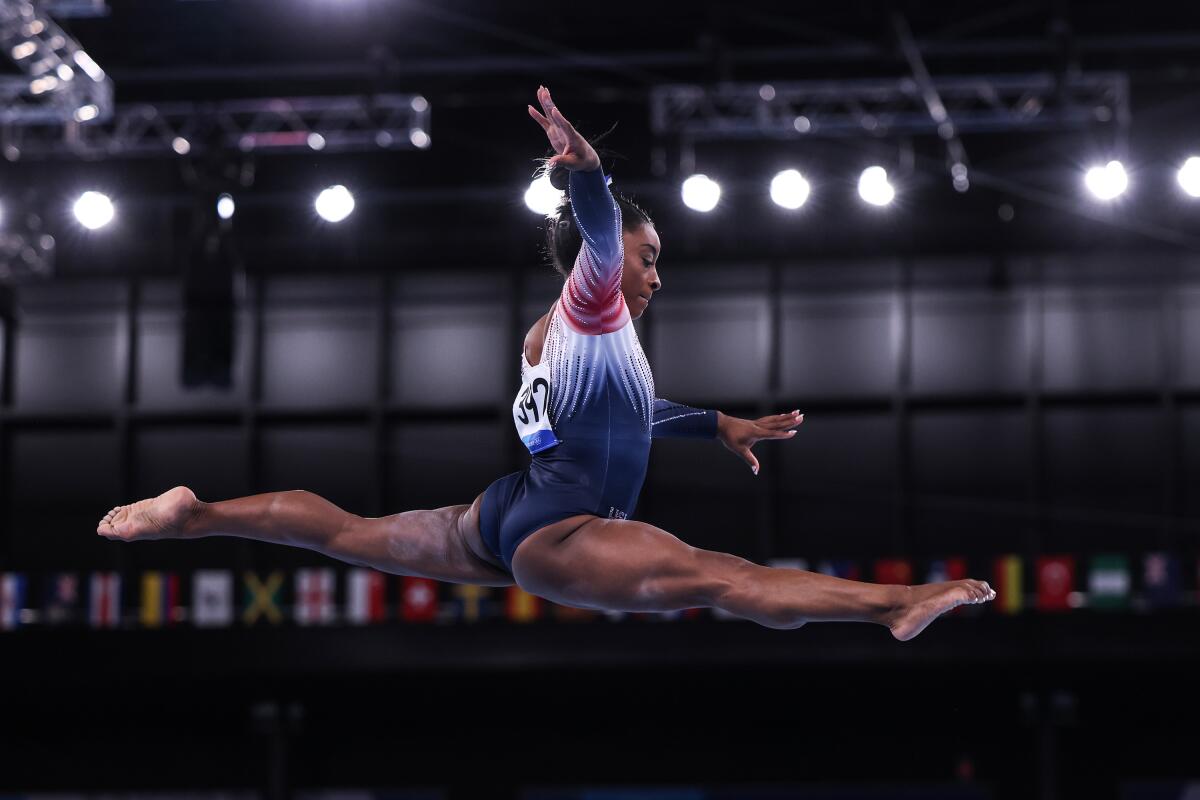
- Share via
TOKYO — This one was for her, so she could enjoy the challenge and adrenaline of competing again, a familiar pleasure that had been yanked away from her by an onset of spatial disorientation so severe that she risked injury when she attempted a basic twisting move.
Simone Biles wanted one last chance to have a moment of joy after a miserable week of daily medical evaluations and conversations with sports psychologists as they all tried to figure out why her brain and her body had suddenly and stubbornly ceased to cooperate. That misfire led her to scratch from the women’s team event and withdraw from the finals of the all-around, floor exercise, vault and uneven bars. “It wasn’t easy pulling out of all those competitions,” she said. “People just thought it was easy, but I just physically and mentally was not in the right head space and I didn’t want to jeopardize my health and my safety, because at the end of the day it’s not worth it.”
All that remained in an Olympic gymnastics competition she had been expected to dominate was the balance beam event final Tuesday night at Ariake Gymnastics Centre.
Biles was cleared to compete late Monday after speaking with officials of the International Gymnastics Federation, the sport’s international governing body. She believed she could get through it if she changed her beam dismount to eliminate the double twist she usually combined with a double flip. She substituted a double pike because she was still not over “the twisties,” as the frightening disorientation is called by gymnasts. “Every time I watch the guys and the girls out there, I want to puke,” she said. “Every time I watch them do a double-double, because I cannot fathom how they’re doing it.”
Gymnasts and coaches explain how many cope with “the twisties,” which prompted Simone Biles to withdraw from team and all-around competition at the Tokyo Olympics.
Drawing on instinct and nerve, Biles performed a strong routine that earned a score of 14.000. It wasn’t packed with the ridiculously difficult moves she usually reeled off, and it was properly ranked behind the performances of Chinese teenagers Guan Chenchen (14.633) and Tang Xijing (14.233). But it was infinitely precious to Biles.
“The pressure was there, but I was doing it more for myself, and I was excited to just compete at the Olympic Games, because that’s what I planned coming in,” Biles said after earning her seventh Olympic medal, tying Shannon Miller for the most career Olympic medals won by an American gymnast.
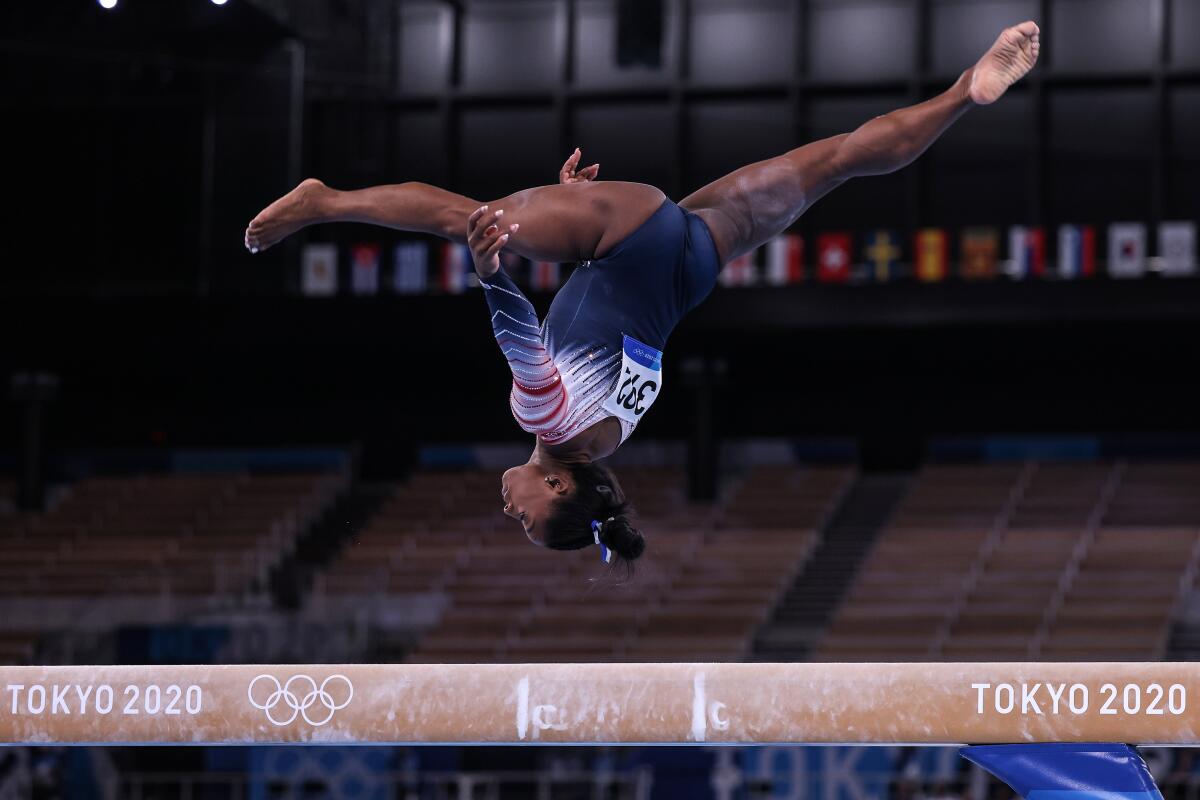
“To be cleared to do beam, which I didn’t think I was going to be, just meant the world to be back out there. I wasn’t expecting to walk away with a medal. I was just going out there doing this for me and whatever happens, happens.”
No one should begrudge her that opportunity.
Biles, 24, is many things to many people. Most visibly she has been an innovator who has moved the sport forward with her power and strength, winning a record 25 medals in world championship competition. Her skills and sustained excellence have made her a role model for all athletes — especially for women of color, who see her and dare to dream big dreams.
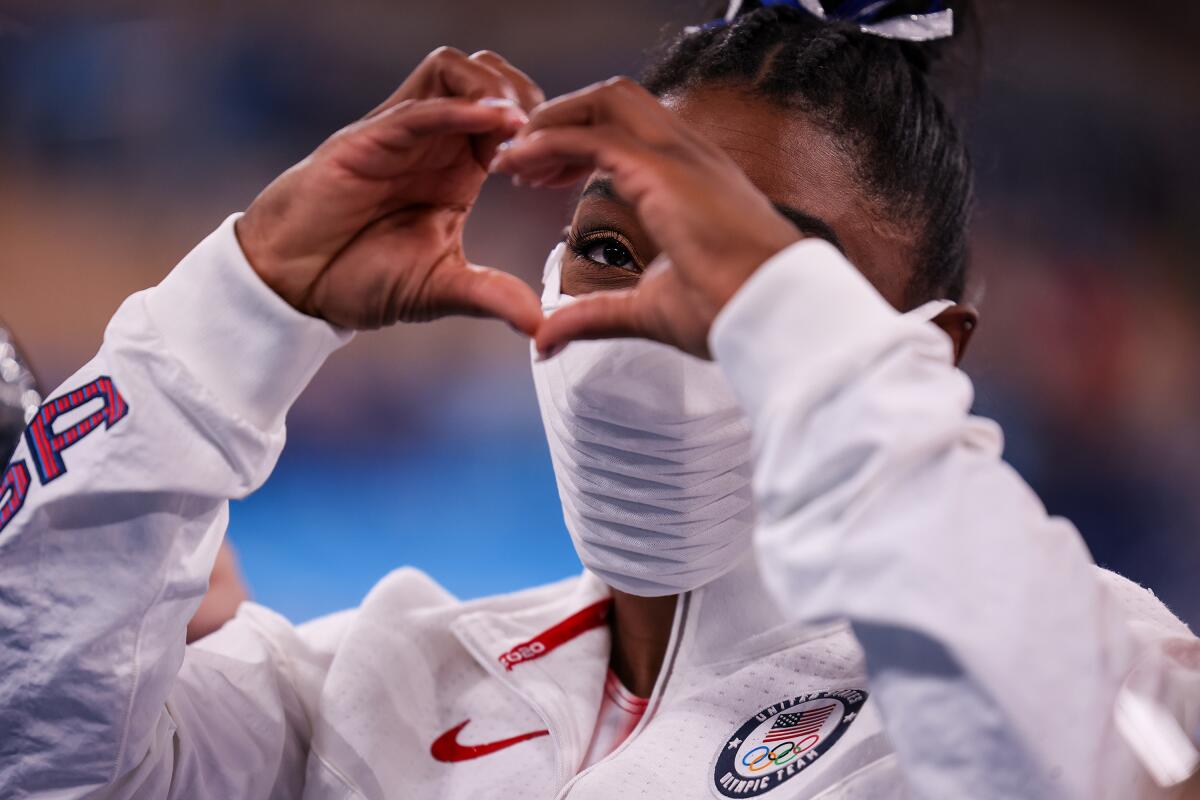
Equally important, she has been a gadfly to USA Gymnastics, neither forgiving nor forgetting its mishandling of the long-term sexual abuse inflicted against gymnasts by former national team doctor Larry Nassar. She won’t let the organization forget the horrors it allowed to happen. Her voice carries great weight, and her perseverance will make the sport safer for all who follow.
Her remarkable return on Tuesday wasn’t selfish. A bronze medal added to the team silver her teammates won for her won’t make her more valuable as an endorser than she was as a five-time medalist before the Tokyo Games.
If anything, she may have lost some commercial opportunities by not competing while Suni Lee won the all-around gold medal and bronze on the uneven bars, reserve MyKayla Skinner stepped in to win silver in the vault, and Jade Carey bounced back from a stumble in the vault final to earn gold on floor exercise.
A bronze medal in the uneven bars final on Sunday completed Suni Lee’s set of Tokyo Olympic hardware.
Biles had no choice but to back off. “I was OK with missing [the team] finals because I knew I couldn’t do it. My problem was why my body and my mind weren’t in sync, and that’s what I couldn’t wrap my head around what happened,” she said. “Was I overtired? And where did the wires not connect?
“And that was really hard because it’s like I trained my whole life. I was physically ready. I was fine, and then this happens, and it was something that was so out of my control. But the outcome that I had at the end of the day, my mental and physical health, is better than any medal, so I couldn’t be mad.”
Lee wobbled a few times in the balance beam final and finished fifth but emerged as one of the sport’s new stars with a complete set of medals in gold (all-around), silver (team) and bronze (uneven bars). She’s due to return home to St. Paul, Minn., in a few days and soon afterward leave for college at Auburn. She plans to pack her shiny Olympic souvenirs when she leaves for school.
“Probably, because they’re my Olympic medals and I don’t want to lose them. And I don’t want anything to happen to them,” Lee said. “I’m going to take my worlds medals too, just in case.”
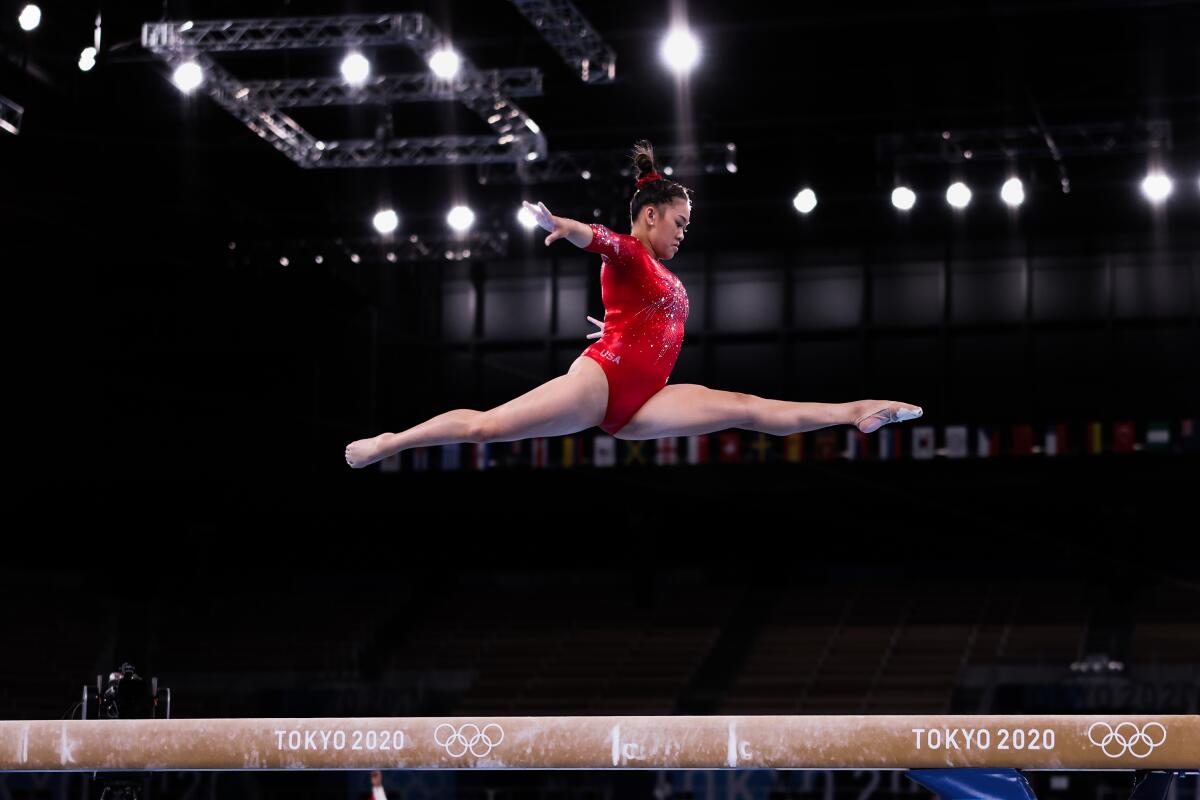
China and the Russian Olympic Committee tied for the most men’s and women’s gymnastics medals here with eight each. Chinese athletes won more gold medals than the Russians, 3 to 2, but the Russians won their gold in the men’s and women’s team events. U.S. gymnasts — all women — won six medals.
The American men had a fourth-place finish by Brody Malone in the horizontal bar final and a sixth-place finish by Sam Mikulak of Newport Coast in the parallel bars final. For Mikulak, a six-time U.S. all-around champion who plans to retire from competition, victory came in pushing his aching body through the one-year delay caused by the COVID-19 pandemic and through mental health issues.
“I’m at peace and I’m happy,” Mikulak said. “I feel right where I need to be mentally, physically.”
Biles hasn’t reached that stage yet. “I feel like there’s a lot of relief,” she said. “I don’t know. I don’t really know how I’m feeling right now. I feel like I have to go home and work on myself and be OK with what’s happened.”
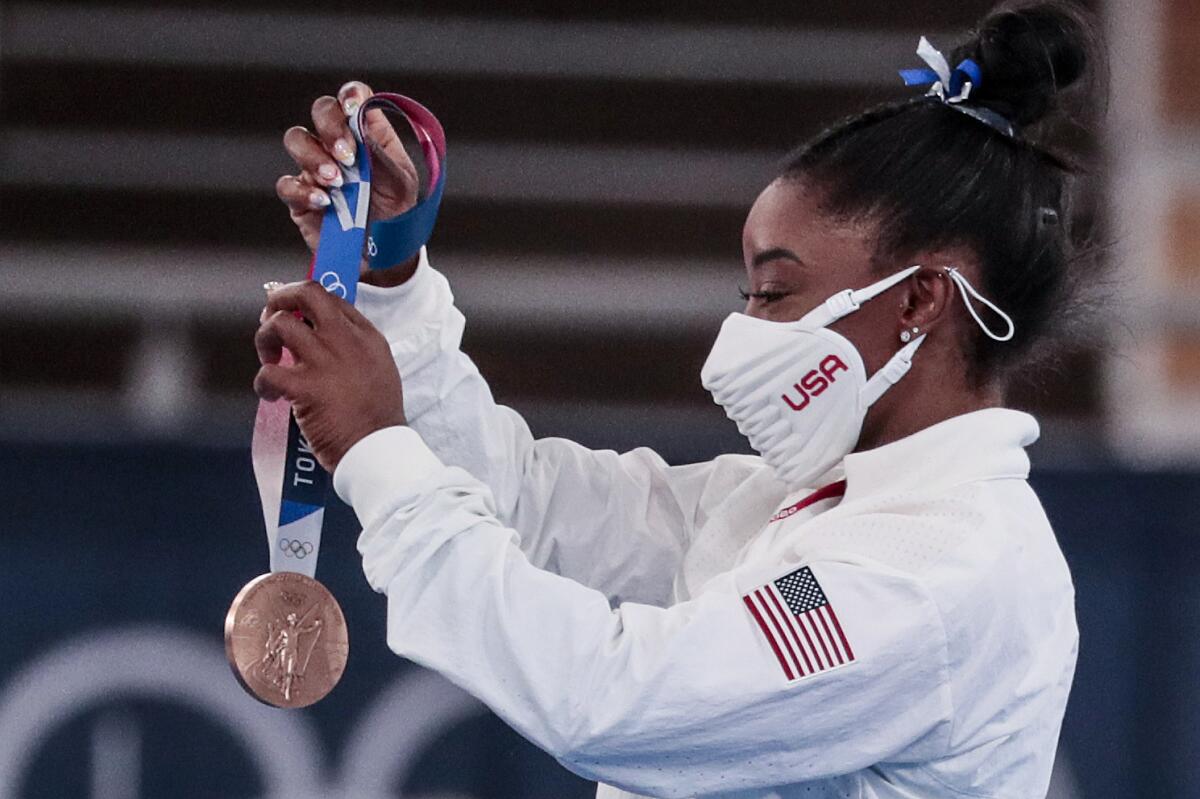
More to Read
Go beyond the scoreboard
Get the latest on L.A.'s teams in the daily Sports Report newsletter.
You may occasionally receive promotional content from the Los Angeles Times.

